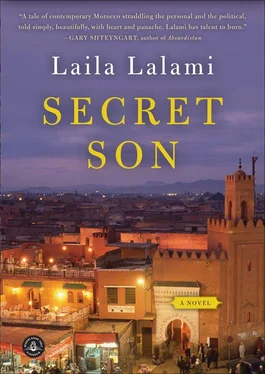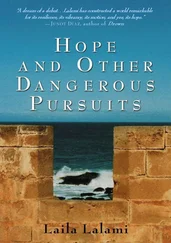The look on the doorman’s face when Youssef arrived home told him that what had happened at the hotel was not a mistake. The doorman stood up quickly, his red prayer mat sliding from the back of his chair to the ground. He picked it up with one hand and held the other up to stop Youssef from going in. “What is it?” Youssef said as firmly as he could. He walked past the old man into the lobby and pressed the button for the elevator. “I’m in a rush.”
“There’s no need to go up there, my son,” the doorman said, his voice tinged with weariness. “The locks have been changed.”
Youssef whipped around to face him, his worn beige suit hanging loosely on his thin body, his mouth nearly toothless, his eyes disappearing under the folds of his lids, his forehead marked by a round spot of piety. Even though Youssef knew that this poor, devout man would never have dared touch the locks without an order from his father, he could not help yelling. “Are you mad? How dare you change my locks?”
“It was the owner who did it,” the doorman said.
“Who are you talking about?”
“Madame Amrani called me from abroad. She told me a locksmith would come.”
So she was the one behind all this. Madame Amrani, his mother’s rival, and now his, too. “Does my father know about this?”
The doorman remained silent.
“He’s my father.”
The old man looked away.
“Do you know that? Do you know he’s my father?”
“Whatever you say, my son.”
It was useless. “What about my things?” Youssef asked. “Where are they?”
“I have them.” The doorman went inside his ground-floor office and fetched a large pillowcase filled with clothes. “Here.”
“This is it?” Youssef asked. “What about my books? My movies? All my shoes?”
“I only took what I could while the locksmith was waiting, my son. Don’t get angry with me. Take it up with her when she returns. And if you think I took anything from you, you’re welcome to check inside the office.”
Youssef felt like shaking this man, who had been nothing but kind to him, this helpless man, who was like so many other people in the country, completely disabused of the notion that there was much use fighting against injustice. The only thing that stopped Youssef was the look in the man’s eyes, a look that made it clear he would accept this indignity as he had accepted all the others life had dealt him.
YOUSSEF CARRIED HIS BAG to the nearest café and sat there all afternoon, his chin resting on his palm. He took out his mobile phone to call his father’s secretary. “Who is calling, please?” she asked in the nasal voice he remembered.
“This is … Driss Ayyadi,” Youssef said. “I’m a journalist.”
“I’m sorry, sir. He is out of the office.”
“Do you know when he’ll be back?”
“I’m not sure.”
It annoyed Youssef that Fadila was so protective of her boss as to keep the date of his return a secret — unless, he thought suddenly, she had been told to remain quiet. “That’s too bad,” he said, trying to hit the right note of professional rather than personal disappointment. “I wanted to talk to him about a piece I’ve been commissioned to do for Le Monde.”
The mention of the French newspaper got her attention. She spoke quickly now. “He’s in the United States until the nineteenth. After that, he goes on vacation in Spain for ten days. He won’t be back until the end of June.”
Nabil had never mentioned that he would be gone for so long. Why the omission? And the way he had spoken the last time Youssef saw him had been so strange, so full of foreboding and sadness. Youssef had a sinking feeling in his stomach, yet he tried to keep his voice level. “So he’ll be back in the office on the thirtieth?”
“Yes, sir. If you’d like to give me a phone number, I will make sure he gets the message.”
Youssef made up a number and hung up. Although he tried to keep the thought out of his mind, it imposed itself upon him like light upon night: his father had left him. He smoked what remained of his pack of Dunhills while watching young people his age sitting in the café. They seemed so confident, so sure of themselves and of who they were. Just yesterday he might have been able to deceive himself into believing that he, too, was of their world, not just in it.
It had taken a little over an hour to undo all of his life, just as two years ago his life had been turned upside down in the same amount of time. Why was this happening to him? Why did God look on as His creatures went through such pain and not see fit to save them? Youssef felt the last vestiges of faith leave his heart, replaced by hate for Madame Amrani.
And there was, too, along with the hate, the shame that had been waiting at every corner for him, the shame of having failed in his endeavor, of having accomplished exactly what his mother had told him he would — which is to say, nothing. He realized now that he had only played the part of Youssef Amrani, but all along he had remained Youssef El Mekki.
As dusk fell, he began to shiver. He looked around him. Afternoon patrons had left, and now the evening clientele had begun to appear. He felt even more out of place. It was time to leave. But how could he show himself in Hay An Najat again, after everything that had happened? He dropped his face in his hands and tried to suppress his sobs for as long as he could, but it was useless. Soon he became aware of the other patrons’ stares, and he quickly wiped his eyes with his napkin. He held the pillowcase full of his belongings and walked, dragging his feet, to the bus station.

It was the smell that got to him first. He had forgotten about the stench of garbage mixed with the odor of car exhaust and the stink of old, refried sardines that permeated the street, but as soon as he stepped off the bus, he began to cough uncontrollably. The cart that sold boiled chickpeas still sat around the corner from the bus station, and so did the vegetable stand. Kids loitered at corners, leaning against walls. Discarded black plastic bags dotted the ground, and clotheslines crisscrossed the alleys. The walk from the bus station to his mother’s house, which had seemed so short to him when he lived here, now seemed to take forever.
The streets and alleys were full: women getting water, girls carrying shopping bags, drug addicts huddled in groups, merchants peddling their wares from rickety bicycles, teenagers hawking single cigarettes, children playing marbles. Youssef thought that all eyes were on him, that the entire neighborhood had found out about his return and had stepped out to watch the humiliated son return home to his mother. He tripped on a rock and fell down, his things spilling out onto the dirt. Several people stopped what they were doing to watch. Jumping up to his feet, he hurriedly collected his belongings, now covered with red dirt. Someone called out his name in the distance, but he pretended not to hear. He trotted the rest of the way to his mother’s house. To his immense relief, the door was unlocked.
He stepped inside and closed the door behind him, finally allowing himself a breath. The smell of mint tea hung in the air. There were dishes drying on the rack in the corner, right on the battered cement floor. Three housedresses in faded colors hung on the laundry line, against walls whose paint was cracked like broken eggshells. The corrugated tin roof over the bedroom was eaten by rust, and the satellite dish mounted on it was covered with bird excrement. The house looked the same as he remembered it.
His mother looked up at him from the divan where she was curled up. She shot to her feet now, and the bowl of sunflower seeds that had been nestled in her lap dropped to the floor. The seeds scattered everywhere. For a moment, it felt to Youssef as though time had suspended itself. He looked at her, wordlessly communicating that what she had warned him against had finally come to pass. She nodded once.
Читать дальше













